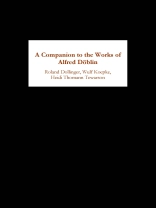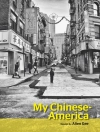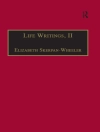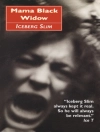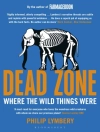A volume of carefully focused essays illuminating the works of one of the leading 20th-century German writers.
Alfred Döblin (1878-1957) was one of the great German-Jewish writers of the 20th century, a major figure in the German avant-garde before the First World War and a leading intellectual during the Weimar Republic. Döblin greatly influenced the history of the German novel: his best-known work, the best-selling 1929 novel
Berlin Alexanderplatz, has frequently been compared in its use of internal monologue and literary montage to James Joyce’s
Ulysses and John Dos Passos’s
Manhattan Transfer . Döblin’s oeuvre is by no means limited to novels, but in this genre, he offered a surprising variety of narrative techniques, themes, structures, and outlooks. Döblin’s impact on German writers after the Second World War was considerable: Günter Grass, for example, acknowledged him as 'my teacher.’ And yet, while
Alexanderplatz continues to fascinate the reading public, it has overshadowed therest of Döblin’s immense oeuvre. This volume of carefully focused essays seeks to do justice to such important texts as Döblin’s early stories, his numerous other novels, his political, philosophical, medical, autobiographical, and religious essays, his experimental plays, and his writings on the new media of cinema and radio.
Contributors:Heidi Thomann Tewarson, David Dollenmayer, Neil H. Donahue, Roland Dollinger, Veronika Fuechtner, Gabriele Sander, Erich Kleinschmidt, Wulf Koepke, Helmut F. Pfanner, Helmuth Kiesel, Klaus Müller-Salget, Christoph Bartscherer, Wolfgang Düsing.
Roland Dollinger is associate professor of German at Sarah Lawrence College; Wulf Koepke is professor emeritus of German at Texas A&M University; Heidi Thomann Tewarson is professor of German at Oberlin College.
Spis treści
Introduction by Roland Dollinger, Wulf Koepke, and – Heidi Thomann Tewarson
Döblin’s Early Collection of Stories,
Die Ermordung einer Butterblume: Toward a Modernist Aesthetic – Heidi Thomann Tewarson
The Advent of Döblinism:
Die drei Sprünge des Wang-lun and
Wadzeks Kampf mit der Dampfturbine – David Dollenmayer
The Fall of Wallenstein or the Collapse of Narration? The Paradox of Epic Intensity in Döblin’s
Wallenstein (1920)
Wallenstein (1920) – Neil H. Donahue
Technology and Nature: From Döblin’s
Berge Meere und Giganten to a Philosophy of Nature – Roland Dollinger
’Arzt und Dichter:’ Döblin’s Medical, Psychiatric, and Psychoanalytical Work – Veronika Fuechtner
Döblin’s Berlin: The Story of Franz Biberkopf – Gabriele Sander
Döblin’s Engagement with the New Media: Film, Radio, and Photography – Erich Kleinschmidt
Döblin’s Political Writings during the Weimar Republic – Wulf Koepke
Döblin, the Critic of Western Civilization: The
Amazon Trilogy – Helmut F. Pfanner
Döblin’s
November 1918 – Helmuth Kiesel
Döblin and Judaism – Klaus Mueller-Salget
Robinson the Castaway: Döblin’s Christian Faith as Reflected in His Autobiography
Schicksalsreise and His Religious Dialogues
Der unsterbliche Mensch and …Dialogues
Der unsterbliche Mensch and … – Christoph Bartscherer
The Tragedy of Truth: Döblin’s
Hamlet oder Die lange Nacht nimmt ein Ende – Wolfgang Duesing
O autorze
Neil Donahue is Associate Professor of German and Comparative Literature, Hofstra University, Hempstead, NY.
